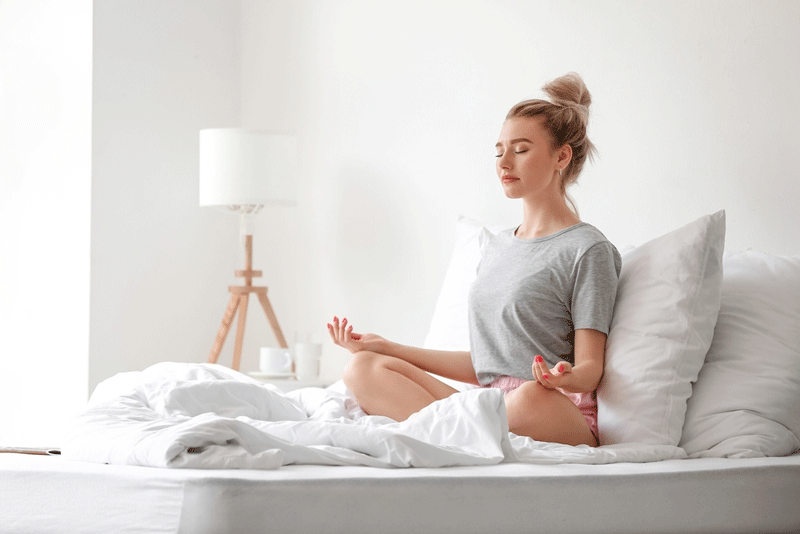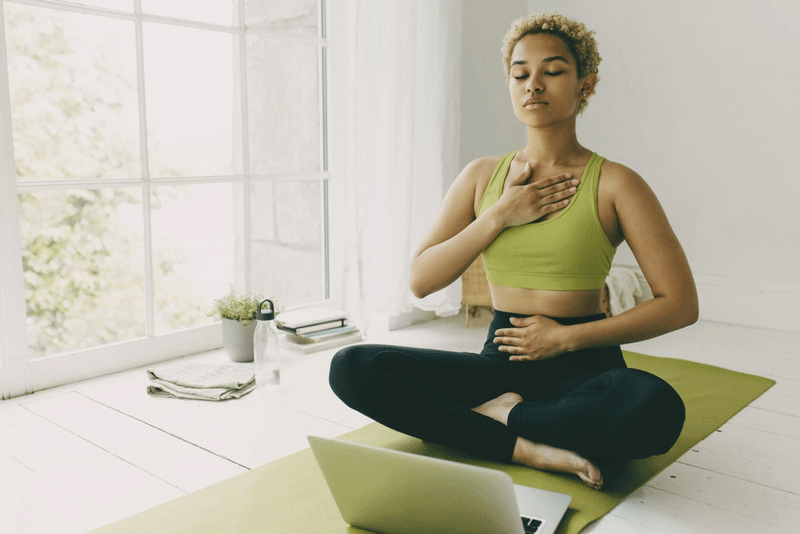Meditation is a practical tool to calm your mind, relax your body, and alleviate stress. It plays a pivotal role in improving sleep quality and reducing anxiety levels. By practicing meditation, you can redirect your attention from racing thoughts and relieve physical tension, which can help you achieve peaceful sleep.
However, it’s essential to recognise that while meditation is a valuable technique for managing anxiety and sleep issues, it should not replace professional help when needed. Whether you grapple with situational anxiety or believe you might have an anxiety disorder, therapy is also an indispensable resource for managing your brain health.
The Link Between Sleep and Anxiety
Sleep and anxiety share a complex relationship. Anxiety can lead to disrupted sleep patterns that make it challenging to fall asleep or stay asleep. Conversely, inadequate sleep can exacerbate anxiety symptoms, creating a vicious cycle that impacts mental and emotional well-being.
How Meditation Helps
Meditation is a profound tool that addresses both anxiety and sleep issues simultaneously. Here’s how it can help:
- Anxiety Reduction: Meditation promotes relaxation by shifting your focus away from the hustle and bustle of daily life. It encourages mindful awareness, letting you let go of anxious thoughts about the past or future.
- Stress Release: Through deep breathing and intentional mindfulness, meditation activates your body’s relaxation response. This counteracts the stress response associated with anxiety, lowering heart rate, reducing muscle tension, and regulating breathing.
- Enhanced Self-Awareness: Meditation enables observing anxious thoughts without judgment. This non-reactive attitude helps you regain control and minimizes anxiety’s impact on your well-being.
- Improved Sleep Quality: Meditation calms the mind by redirecting your thoughts away from sleep-related concerns. It nurtures inner tranquillity, making it easier to transition into a peaceful state conducive to sleep.
- Healthy Sleep-Wake Cycle: Regular meditation can regulate your body’s stress response system, lower physical arousal levels, and encourage a more consistent sleep-wake cycle. It creates a soothing bedtime ritual that supports restful sleep and stress relief.
Step-by-Step Meditation
If persistent anxiety keeps you awake at night, here’s a step-by-step mindfulness meditation practice designed to help manage nighttime anxiety. You can comfortably practice this guided meditation while sitting up or lying down. It’s ideal for finding a moment of serenity, even in bed.
- Find a quiet, comfortable area to sit or lie down.
- Close your eyes and take a deep breath, filling your lungs with fresh air.
- Exhale slowly, and it will release any tension or stress from your body.
- Begin to focus on your breath, observing its natural rhythm.
- If your mind wanders, gently guide your attention back to your breath.
- As you breathe, visualize a calming light spreading through your body, from head to toe.
- Let this soothing light dissolve anxiety or restlessness, allowing you to relax deeply.
- Continue to breathe mindfully, knowing that each breath nourishes your mind and body with peace and serenity.
- As you prepare to sleep, maintain this tranquillity and surrender to restful slumber.
- Know that you are safe, protected, and supported on your journey to better sleep and reduced anxiety.
Does Meditation Help With Insomnia?
Insomnia is characterized by difficulty falling and staying asleep or experiencing restful sleep. Meditation addresses the underlying factors contributing to sleep disturbances. By cultivating deep relaxation and inner calm, meditation reduces the racing thoughts, worries, and anxiety often linked to insomnia. By redirecting attention away from sleep-related concerns, meditation promotes mental tranquillity, which helps calm the mind and prepare for sleep.
Regular meditation can regulate your body’s stress response, lower physical arousal levels, and encourage a healthier sleep-wake cycle. Incorporating meditation into your nightly routine helps to create a soothing and mindful environment that supports restful sleep and alleviates insomnia symptoms.
If your insomnia affects your daily life, consult your healthcare professional or sleep specialist for assessment and treatment recommendations to improve your sleep quality.
Reasons Of Anxiety Gets Worse At Night
Anxiety often intensifies at night for various reasons:
- Reduced Distractions: With fewer daytime activities and responsibilities, anxious thoughts can become more frequent in the quiet of the night.
- Fatigue and Exhaustion: After a long day, mental defenses may weaken, making it easier for anxiety to take hold and intensify.
- Overthinking: The calmness and loneliness of the night provide an ideal environment for overthinking and dwelling on negative thoughts, amplifying anxiety.
- Hormonal Changes: Natural hormonal fluctuations in the evening can impact mood and anxiety levels, potentially worsening anxiety at night.
- Lack of Support: During nighttime hours, access to social support or professional help may be limited, which makes it more challenging to manage anxiety effectively.
- Fear of the Unknown: Darkness and nighttime uncertainties can trigger fears and worries, heightening anxiety symptoms.
Conclusion
Everyone’s experience with anxiety is unique, and triggers may vary. Identifying personal triggers and developing coping strategies tailored to your needs is crucial for managing nighttime anxiety. Don’t hesitate to seek professional help when necessary.


